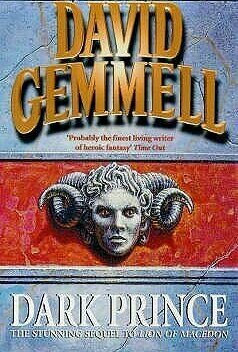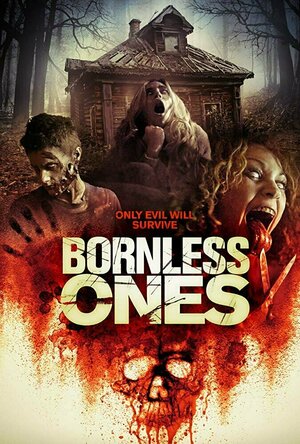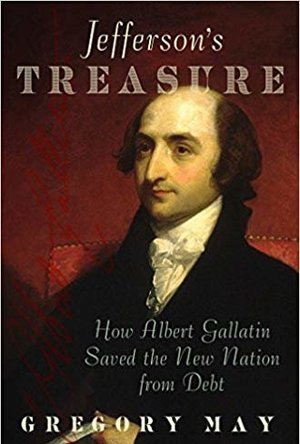Search
Search results
David McK (3695 KP) rated Dark Prince (Greek Series, #2) in Books
Jul 25, 2020
Sequel to David Gemmell's earlier Lion of Macedon, with more emphasis on the mystical elements this time around: whereas that earlier novel was perhaps 90/10 in favour of history, this is (IMO) closer to 40/60.
As the novel starts, Alexander is but a 4 year old and Parmenion is out of favour with Philip of Macedon, who is jealous of the Spartan general's success in battle. Alexander is still plagued by the Chaos Spirit, and - at around the 1/4 mark - is magically transported into an alternate Greece, where the myths and monsters of Greek legend are all real. With a little help from Aristotle and the Siptrassi stones, Parmenion is soon off on a rescue mission, accompanied by Philip's assassin Attalus (without Philips knowledge). The bulk of this novel - parts 2 and 3 (of 4) - then takes place in that alternate Greece, with Parmenion - again - reliving his past and playing a key role in proceedings, before it returns to 'our' Greece for the final part of the novel.
As is standard for Gemmell, lots of musing on the nature of Good and evil throughout, and with a conflicted central protagonist.
As the novel starts, Alexander is but a 4 year old and Parmenion is out of favour with Philip of Macedon, who is jealous of the Spartan general's success in battle. Alexander is still plagued by the Chaos Spirit, and - at around the 1/4 mark - is magically transported into an alternate Greece, where the myths and monsters of Greek legend are all real. With a little help from Aristotle and the Siptrassi stones, Parmenion is soon off on a rescue mission, accompanied by Philip's assassin Attalus (without Philips knowledge). The bulk of this novel - parts 2 and 3 (of 4) - then takes place in that alternate Greece, with Parmenion - again - reliving his past and playing a key role in proceedings, before it returns to 'our' Greece for the final part of the novel.
As is standard for Gemmell, lots of musing on the nature of Good and evil throughout, and with a conflicted central protagonist.
Leanne Crabtree (480 KP) rated The Bronze Horseman in Books
Jan 6, 2021
2.5 stars.
Reading this on Scribd probably wasn't the best idea ever. Having to sit at my computer for god knows how many hours while I read all 800+ pages...
It started great, I loved Tatiana and her first meeting with Alexander...but then it went downhill from there when it turned out Alexander was the guy her sister had been seeing. It got progressively worse for me when she decided to end whatever blossoming thing they had as she felt she would break her sisters heart if she got together with him instead. This continued for almost half the book, which drove me mad--it was pretty repetative, especially considering it was set during the war and they might not live to see the end of it.
People changed over that time, lots of people died. I think one of my updates quite clearly captured this:
<blockquote>"Really driving me mad now :( You're sister is not a nice person anymore, Tatiana. If anyone deserves Alexander it's you for still being the same person you were at the start of the book, the same person that Alexander fell in love with. I hope, beyond everything, that you break your promise so that he has a reason to call things off with your sister so you can be together!!!!" </blockquote>
The ups and downs every few % did my head in. One minute they were kissing and saying nice things and the next they were shouting and arguing with each other.
I thought it would improve after the halfway point when they finally leave Leningrad but it continued for another 10% or so. I was expecting them to do the deed and then be all nice and happy. And this was the case for a while. Eat, have sex. Swim, have sex. Wash up, have sex...Repetative once more.
By the 70% mark, after reading each page word for word--and after almost a month of reading--I just wanted it over with and skimmed the remaining 250 pages. I got the gist and though I was happy they got together in the end I can't say I'm interested in finishing the trilogy. Really, stupidly, long books are not for me.
Reading this on Scribd probably wasn't the best idea ever. Having to sit at my computer for god knows how many hours while I read all 800+ pages...
It started great, I loved Tatiana and her first meeting with Alexander...but then it went downhill from there when it turned out Alexander was the guy her sister had been seeing. It got progressively worse for me when she decided to end whatever blossoming thing they had as she felt she would break her sisters heart if she got together with him instead. This continued for almost half the book, which drove me mad--it was pretty repetative, especially considering it was set during the war and they might not live to see the end of it.
People changed over that time, lots of people died. I think one of my updates quite clearly captured this:
<blockquote>"Really driving me mad now :( You're sister is not a nice person anymore, Tatiana. If anyone deserves Alexander it's you for still being the same person you were at the start of the book, the same person that Alexander fell in love with. I hope, beyond everything, that you break your promise so that he has a reason to call things off with your sister so you can be together!!!!" </blockquote>
The ups and downs every few % did my head in. One minute they were kissing and saying nice things and the next they were shouting and arguing with each other.
I thought it would improve after the halfway point when they finally leave Leningrad but it continued for another 10% or so. I was expecting them to do the deed and then be all nice and happy. And this was the case for a while. Eat, have sex. Swim, have sex. Wash up, have sex...Repetative once more.
By the 70% mark, after reading each page word for word--and after almost a month of reading--I just wanted it over with and skimmed the remaining 250 pages. I got the gist and though I was happy they got together in the end I can't say I'm interested in finishing the trilogy. Really, stupidly, long books are not for me.
Gareth von Kallenbach (980 KP) rated Straw Dogs (2011) in Movies
Aug 7, 2019
Successful actress Amy Sumner (Kate Bosworth) is returning from her big city life to her southern hometown of Blackwater. Along with Amy is her well-educated and wealthy husband, David Sumner (James Marsdon). David quickly finds this vacation is filled with tension, particularly when it comes to Amy’s ex-boyfriend, Charlie (Alexander Skarsgård), who is not ready to be out of her life. So it is up to the weakling Harvard hero to protect his relationship, home, and way of life in a town he doesn’t quite understand.
A remake of the 1971 thriller classic of the same name, “Straw Dogs” has lost a lot of its appeal and logic with time. It still has gory moments and the plot is very similar to the original but many of the base thrills have been lost in the move to a present day setting.
This film asks the viewers to suspend disbelief, ignore a number of unfinished back-stories, and stand behind characters who are not engaging or believable. Details, both big and small miss the mark. James Marsdon is incorrectly suited as the shy bumbling academic. The house is a seeming fortress for no apparent reason. The side stories, interesting detractions from the overly built tension between the two leading males, are left unresolved.
Additionally, the themes are awkward and incomplete. There are literary throwbacks and some blatant social commentary but all of the film’s depth is lost on an audience who has no reason to care. Viewers will be preoccupied wondering what the point of the film is.
Sure, the story is engrossing and it does force self-analysis, but the modern adaptation would have benefitted from serious editorial cuts. Had the film been completed in a quarter of the time it might have actually managed to be thrilling!
Unbalanced, vapid, and pointless as a thriller “Straw Dogs” falls prey to the unnecessary remake trap. For a real psychological thrill it would be better to opt for the original.
A remake of the 1971 thriller classic of the same name, “Straw Dogs” has lost a lot of its appeal and logic with time. It still has gory moments and the plot is very similar to the original but many of the base thrills have been lost in the move to a present day setting.
This film asks the viewers to suspend disbelief, ignore a number of unfinished back-stories, and stand behind characters who are not engaging or believable. Details, both big and small miss the mark. James Marsdon is incorrectly suited as the shy bumbling academic. The house is a seeming fortress for no apparent reason. The side stories, interesting detractions from the overly built tension between the two leading males, are left unresolved.
Additionally, the themes are awkward and incomplete. There are literary throwbacks and some blatant social commentary but all of the film’s depth is lost on an audience who has no reason to care. Viewers will be preoccupied wondering what the point of the film is.
Sure, the story is engrossing and it does force self-analysis, but the modern adaptation would have benefitted from serious editorial cuts. Had the film been completed in a quarter of the time it might have actually managed to be thrilling!
Unbalanced, vapid, and pointless as a thriller “Straw Dogs” falls prey to the unnecessary remake trap. For a real psychological thrill it would be better to opt for the original.
365Flicks (235 KP) rated Bornless Ones (2016) in Movies
Nov 20, 2019
Take 4 Outrageously good looking guys and gals, A 5th guy with some sort of life challenging disease… Move them into a new out of the way house with a secret history, not to far from an Institution, Have them desecrate and destroy what look to be supernatural symbols boarding up the windows and you have Bornless Ones… Oh and there is scary possession, Craziness and a fair bit of really well done gore, Seriously well done Gore!!!
Now that’s not to say that this movie lacks originality in any way because it really does not. Ok we may have seen the creepy house in the middle of nowhere that scares the crap out of its occupants before, but can we really ever get too much of that. The difference I found was that Bornless Ones is in many ways a spiritual cousin to movies like Evil Dead and in many ways actually betters what has come before in its Genre. One of those ways is the performance our cast put in.
Emily (Margaret Judson – The Newsroom) has decided that she cant look after her Cerebal Palsy suffering brother Zach (Micheal Johnston – MTV’s Teen Wolf) anymore, she is going to move him to an institution. However fearing he is going to be too far away from her, Emily and her boyfriend Jesse (Devin Goodsell) buy a house nearby, the house has a past. Emily and Jesse are accompanied by there friends Woodrow (Mark Furze – Home and Away, Underbelly) and Michelle (Bobby T) to help them move in. That’s when the movie cranks it up to 11 and everything goes nuts as our core characters are taken hold of by a paranormal force one by one and must fight for survival.
My horror kick has absolutely continued into 2017 and Bornless Ones was a fantastic place to start. Its a hell of a lot more Evil Dead than the Evil Dead Remake which sucked and this movie really had me in from the start. It does help that it wastes no time at all, no sooner had they all moved in and the shenanigans began.
Alexander Babaev has done a great job on Directing and Writing with this movie and while it falls into the Indie bracket of movies it deserves to be seen by a wider audience. The acting from our core cast is better than you might expect, infact they all smash it out of the park. The acting once possession has taken hold is creepy as shit and utterly compelling.
Bornless Ones is definitely worth a watch if you are a fan of this genre, it is a lot better than most of the possession movies coming out these days. Give it a try…
Now that’s not to say that this movie lacks originality in any way because it really does not. Ok we may have seen the creepy house in the middle of nowhere that scares the crap out of its occupants before, but can we really ever get too much of that. The difference I found was that Bornless Ones is in many ways a spiritual cousin to movies like Evil Dead and in many ways actually betters what has come before in its Genre. One of those ways is the performance our cast put in.
Emily (Margaret Judson – The Newsroom) has decided that she cant look after her Cerebal Palsy suffering brother Zach (Micheal Johnston – MTV’s Teen Wolf) anymore, she is going to move him to an institution. However fearing he is going to be too far away from her, Emily and her boyfriend Jesse (Devin Goodsell) buy a house nearby, the house has a past. Emily and Jesse are accompanied by there friends Woodrow (Mark Furze – Home and Away, Underbelly) and Michelle (Bobby T) to help them move in. That’s when the movie cranks it up to 11 and everything goes nuts as our core characters are taken hold of by a paranormal force one by one and must fight for survival.
My horror kick has absolutely continued into 2017 and Bornless Ones was a fantastic place to start. Its a hell of a lot more Evil Dead than the Evil Dead Remake which sucked and this movie really had me in from the start. It does help that it wastes no time at all, no sooner had they all moved in and the shenanigans began.
Alexander Babaev has done a great job on Directing and Writing with this movie and while it falls into the Indie bracket of movies it deserves to be seen by a wider audience. The acting from our core cast is better than you might expect, infact they all smash it out of the park. The acting once possession has taken hold is creepy as shit and utterly compelling.
Bornless Ones is definitely worth a watch if you are a fan of this genre, it is a lot better than most of the possession movies coming out these days. Give it a try…
Sassy Brit (97 KP) rated Jefferson's Treasure: How Albert Gallatin Saved the New Nation from Debt in Books
Jun 5, 2019
Jefferson’s Treasure, by Gregory May, details, “how Albert Gallatin saved the new nation from debt.” Appointed by President Thomas Jefferson to be his Treasury Secretary, Gallatin continued under President Madison, maintaining that position for twelve years. During his tenure, he abolished internal revenue taxes in peacetime, slashed federal spending, and repaid half of the national debt.
So who was this man that undid Alexander Hamilton’s fiscal system, rejecting it along with Madison and Jefferson? Because both Presidents did not understand the financial system, they depended on Gallatin to reform it. Gallatin arrived in America in 1790 from Geneva and rose up to become a trusted advisor of the Republicans. Six years before Jefferson was elected President, Gallatin’s Pennsylvania neighbors rebelled against the tax on whiskey. He supported them in principle but opposed the violence that ensued, burning the local tax collector’s house, robbing the mail, and marching on Pittsburgh.
The play “Hamilton” uses revisionist history. The real Hamilton believed in big government and wanted to continue funding federal deficits. He based his theories on the British who used the money to fund their large military conflicts, believing that the ability to borrow endless amounts of money would allow the new United States to become a great nation. Jefferson and Madison thought Hamilton’s system, straight from the British way, was tainted with tyranny. As May noted, “It made the people pay obnoxious taxes in order to fund interest payments on a mounting federal debt and the costs of an expensive military establishment. It shifted money from ordinary taxpayers to the relatively few rich men who held the government’s bonds. That was just the sort of thing that had led Americans to revolt against Britain in the first place.”
May believes, “The hip-hop immigrant hero of the Broadway musical is a myth. The musical might be a great work of art, but is relies on misconceptions of Hamilton. He was not an immigrant, but a migrant within the British Empire. Also, he was not a man of the people, as Gallatin was, but an elitist.”
While Hamilton committed to paying only the interest on the government’s debt, Gallatin committed the government to repaying fixed amounts of the principal each year. He also insisted that the government should never spend more than it earned except in times of war. By slashing federal expenses, Gallatin was able to get rid of the tax on whiskey and abolish the entire internal revenue service.
The Republicans, an agrarian society, distrusted these elitists where two-thirds of the government debt belonged to a few hundred very wealthy men residing mainly in Philadelphia, New York, and other mercantile cities. They saw Hamilton’s plan of collecting taxes from ordinary citizens as a way for a few rich men to become even wealthier. Implementing these excise taxes required government officials to inspect, quantify, and mark the items subject to tax.
The Hamilton system benefited the wealthy debt holders and spectators at the expense of the average taxpayer who had to pay the interest. The government would borrow more than the people could pay. Hamilton tried to hide how much money the government was actually spending and spiraled the debt higher and higher.
This was an important part of the British tax base, and “I wanted to show how unpopular it was. Hamilton and company were resented because they created a tax collection network that affected the lives of ordinary citizens. The excise tax is a form of internal taxation, while tariffs are a form of external taxation that fell on the well to do. Remember mostly the well to do bought imports. The Republicans once they came to power relied on import duties rather than excise taxes.”
May further explained, “When Jefferson and his administration came to power it was Gallatin who got rid of Hamilton’s deficit finance system and cut taxes. By the time he has left office he has repaid half the federal debt and set up a program for repaying the rest.”
Anyone who wants to understand the early economic systems of the Founding Fathers will enjoy this book. It shows how Gallatin, by killing Hamilton’s financial system, abolished internal revenue taxes in peacetime, slashed federal spending, and repaid half of the national debt.
So who was this man that undid Alexander Hamilton’s fiscal system, rejecting it along with Madison and Jefferson? Because both Presidents did not understand the financial system, they depended on Gallatin to reform it. Gallatin arrived in America in 1790 from Geneva and rose up to become a trusted advisor of the Republicans. Six years before Jefferson was elected President, Gallatin’s Pennsylvania neighbors rebelled against the tax on whiskey. He supported them in principle but opposed the violence that ensued, burning the local tax collector’s house, robbing the mail, and marching on Pittsburgh.
The play “Hamilton” uses revisionist history. The real Hamilton believed in big government and wanted to continue funding federal deficits. He based his theories on the British who used the money to fund their large military conflicts, believing that the ability to borrow endless amounts of money would allow the new United States to become a great nation. Jefferson and Madison thought Hamilton’s system, straight from the British way, was tainted with tyranny. As May noted, “It made the people pay obnoxious taxes in order to fund interest payments on a mounting federal debt and the costs of an expensive military establishment. It shifted money from ordinary taxpayers to the relatively few rich men who held the government’s bonds. That was just the sort of thing that had led Americans to revolt against Britain in the first place.”
May believes, “The hip-hop immigrant hero of the Broadway musical is a myth. The musical might be a great work of art, but is relies on misconceptions of Hamilton. He was not an immigrant, but a migrant within the British Empire. Also, he was not a man of the people, as Gallatin was, but an elitist.”
While Hamilton committed to paying only the interest on the government’s debt, Gallatin committed the government to repaying fixed amounts of the principal each year. He also insisted that the government should never spend more than it earned except in times of war. By slashing federal expenses, Gallatin was able to get rid of the tax on whiskey and abolish the entire internal revenue service.
The Republicans, an agrarian society, distrusted these elitists where two-thirds of the government debt belonged to a few hundred very wealthy men residing mainly in Philadelphia, New York, and other mercantile cities. They saw Hamilton’s plan of collecting taxes from ordinary citizens as a way for a few rich men to become even wealthier. Implementing these excise taxes required government officials to inspect, quantify, and mark the items subject to tax.
The Hamilton system benefited the wealthy debt holders and spectators at the expense of the average taxpayer who had to pay the interest. The government would borrow more than the people could pay. Hamilton tried to hide how much money the government was actually spending and spiraled the debt higher and higher.
This was an important part of the British tax base, and “I wanted to show how unpopular it was. Hamilton and company were resented because they created a tax collection network that affected the lives of ordinary citizens. The excise tax is a form of internal taxation, while tariffs are a form of external taxation that fell on the well to do. Remember mostly the well to do bought imports. The Republicans once they came to power relied on import duties rather than excise taxes.”
May further explained, “When Jefferson and his administration came to power it was Gallatin who got rid of Hamilton’s deficit finance system and cut taxes. By the time he has left office he has repaid half the federal debt and set up a program for repaying the rest.”
Anyone who wants to understand the early economic systems of the Founding Fathers will enjoy this book. It shows how Gallatin, by killing Hamilton’s financial system, abolished internal revenue taxes in peacetime, slashed federal spending, and repaid half of the national debt.




